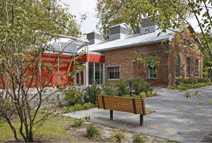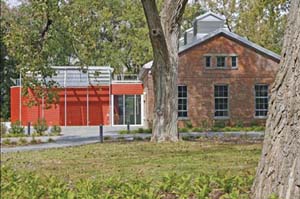- Geothermal technology uses the consistent temperature of the earth to warm the air during winter and cool the air during the summer.
- Solar energy collection tubes harness the power of the sun to provide
domestic hot water year-round and
augment the geothermal heating in
the winter. Solar energy also provides
cooling assistance via fin-tube radiators
around the wind towers. The hot water
in these radiators induces a draft to pull cool air produced by the geothermal system through the building on warm
summer days. - Composting toilets, based on one of nature’s most basic principles—organic decomposition—use only three ounces of water plus a biocompatible soap in each flush (most toilets use a minimum of 1.5 gallons). Over 90% of the waste material that goes into the basement composting chamber will break down into water vapor and carbon dioxide vented outside.
- Over the new addition to the
building, a “green roof” of indigenous plants reuses water and reduces heat
absorption to keep the building cooler. - A specially engineered permeable parking lot allows rainwater to be filtered into the soil below.
- Natural vegetation in the bioretention pond filters other run-off water from the property before it returns to the watershed.
- Electricity is purchased through a
program that supports the development
of clean and sustainable energy in New York State. - “Green dashboard” technology for
real-time monitoring of the building’s
environmental performance is planned for monitoring energy use, either on site or via the Internet.
The Center for Environmental Innovation and Education
CEIE Hours :
Mon-Thurs, 10am - 3pm
Fridays closed
Sat-Sun, 10am - 3 pm

Beacon Institute's Center for Environmental Innovation and Education (CEIE) is located in Denning's Point State Park, in the heart of the City of Beacon's active Hudson River waterfront. Part of Hudson Highlands State Park, Denning's Point boasts accessible walking and biking paths and rich cultural and archaeological history. It is near Scenic Hudson's Long Dock property, the Dia:Beacon museum and the Metro-North train station.
The CEIE opened in December 2008. CEIE is home to the Institute's educational programs and events, policy initiatives and technology workshops.
The CEIE is also a public visitor's center for Denning's Point State Park, and is located near the entrance to the Denning's Point State Park's public walking trail.
A model of green design by Gensler Architects, the CEIE is an adaptive restoration of an abandoned late 19th century industrial building that manifests the Institute's commitment to energy-efficient systems, sustainability and green building technology.
Both the adaptive reuse of the handsome older brick portion, and the new attached annex were handled with great sensitivity. The annex is designed with a contemporary lightness, with large glass areas for viewing the surrounding river and forest vistas.
The contrast between the two building elements emphasizes and illuminates the beauty of each. The design is respectful: it honors the building's industrial past, while emphasizing the Institute's contemporary mission
Equipped with surround-sound videoconferencing, broadcasting and simulcasting capabilities, as well as a THX sound system and professional theatrical lighting, the CEIE’s flexible spaces can be reconfigured for multiple uses, including seminars, workshops, exhibits, public forums and cultural and social events.
Public outreach programming at Beacon Institute's CEIE includes:
- Third Thursdays:
Lively exploration of timely topics involving water and environmental issues. Monthly series runs April through September.
- Walk & Talks:
Informative and engaging trail walks around Denning's Point led by regional experts.
- Special Events:
Many educational, community and other events are held at CEIE annually.





